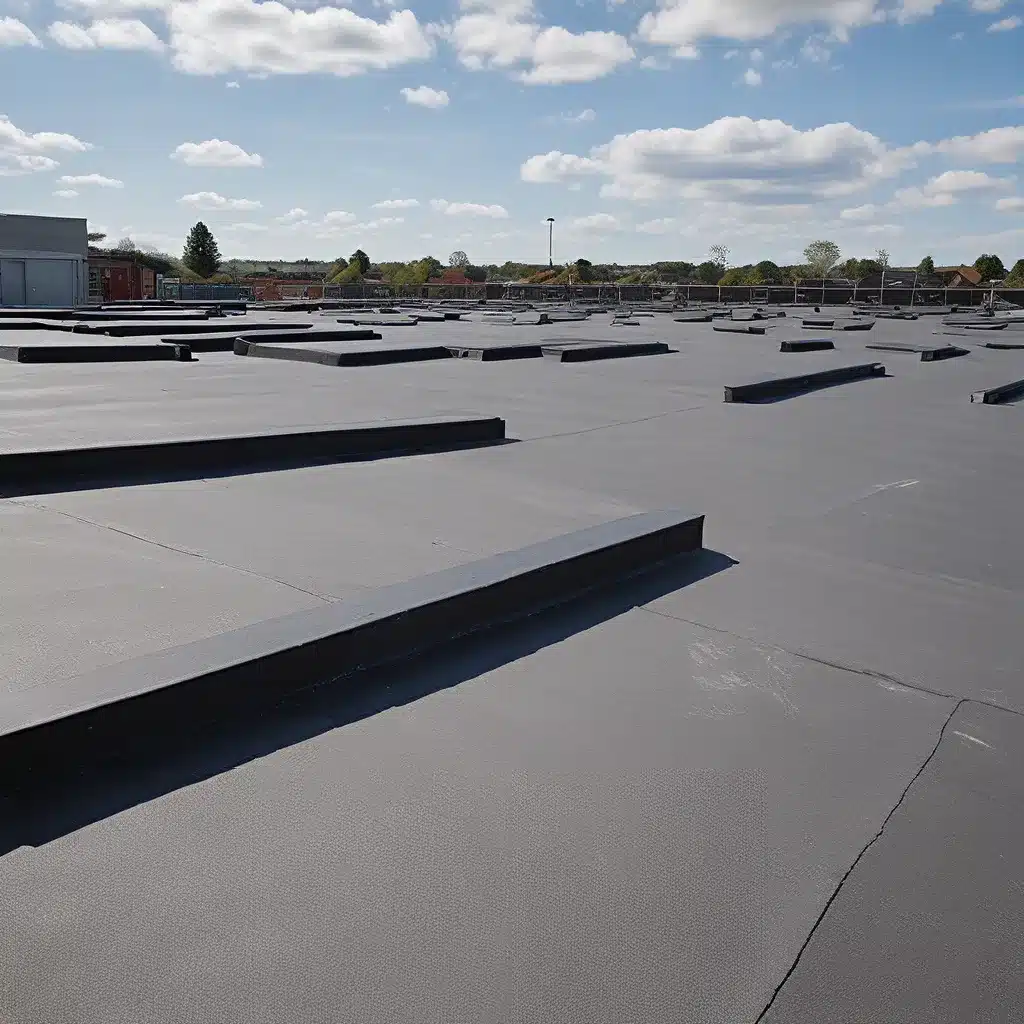
When it comes to commercial roofing, the choice between flat roofs and pitched roofs can be a tricky one. As the Content Manager here at Southern Roofing Company, I’ve seen firsthand how this decision can have a significant impact on the functionality, aesthetics, and overall success of a business.
The Laid-Back Charm of Flat Roofs
Imagine a sleek, modern surface stretching above your head, unfettered by the constraints of a traditional pitched roof. That, my friends, is the beauty of flat roofing. As the cool, laid-back friend of the roofing world, flat roofs offer a range of perks that make them a tempting choice for many commercial buildings.
One of the biggest advantages of flat roofs is their accessibility. With a flat surface, it’s a breeze to hop up there and handle maintenance or inspections. And if you’ve got dreams of a rooftop oasis – be it a garden, lounge area, or solar panels – a flat roof provides ample space utilization to make those visions a reality.
But it’s not all sunshine and rainbows (or lack thereof) with flat roofs. The very feature that makes them so appealing – their flatness – can also pose some challenges when it comes to drainage. Without a natural slope, flat roofs require a meticulous drainage system to prevent water ponding and potential leaks. So if you’re considering a flat roof, be sure to have a plan in place to keep those pesky puddles at bay.
The Classic Charm of Pitched Roofs
Now, let’s talk about the pitched roof – the reliable, sturdy choice that’s been around for ages. Unlike their flat counterparts, pitched roofs have a gentle incline, allowing water, snow, and debris to slide off effortlessly. This natural water runoff feature makes pitched roofs a great option for areas with heavy rainfall or snowfall, reducing the risk of leaks and water damage.
But the benefits of pitched roofs go beyond just functionality. These roofs also offer a wide range of style options, from traditional asphalt shingles to modern metal panels. Whether you’re going for a classic, timeless look or a contemporary vibe, pitched roofs provide the versatility to match your building’s aesthetic.
Of course, with all these perks, there’s a trade-off – pitched roofs can be a bit more expensive upfront. The additional materials and labor required to create that sloped design translate to a higher initial investment. But when you consider the long-term durability and low maintenance needs of pitched roofs, that initial cost may be a worthwhile investment.
Weighing the Pros and Cons
Now that we’ve explored the unique characteristics of flat and pitched roofs, let’s take a deeper dive into how they stack up against each other:
| Feature | Flat Roofing | Pitched Roofing |
|---|---|---|
| Accessibility | Easy access for maintenance and usage | Limited accessibility, may require ladders or scaffolding |
| Drainage | Requires efficient drainage systems | Natural water runoff due to slope |
| Space Utilization | Ample space for rooftop installations like gardens or solar panels | Less usable space due to slope |
| Style Options | Modern, minimalist aesthetic | Wide variety of styles and materials |
| Durability | Less prone to wind damage | Better resistance to heavy rain and snow |
| Cost | Generally more cost-effective upfront | Higher initial cost for materials and labor |
When it comes to choosing between these two roofing options, there’s no one-size-fits-all answer. It all comes down to evaluating your specific needs, preferences, and the unique characteristics of your commercial building.
Making the Right Choice for Your Business
As you weigh the pros and cons, consider factors like your budget, desired aesthetics, maintenance preferences, and, most importantly, the structure of your building. After all, the foundation and design of your commercial space will play a significant role in determining the most suitable roofing solution.
If you’re on the hunt for a sleek, modern look with easy access and ample space, a flat roof might be the way to go. But if you’re in an area with heavy precipitation or you’re drawn to the classic charm and style versatility of pitched roofs, then the pitched option could be the perfect fit.
Ultimately, the decision between flat and pitched roofing is a highly personal one, and it’s crucial to explore all the possibilities before making a choice that will impact your business for years to come. And remember, you don’t have to navigate this decision alone – the experts at Southern Roofing Company are here to guide you every step of the way.
So, whether you’re in the market for a new roof or simply curious about your options, I encourage you to dive deeper into the world of flat and pitched roofing. Who knows, you might just discover the perfect fit for your commercial space – and unlock a world of possibilities in the process.